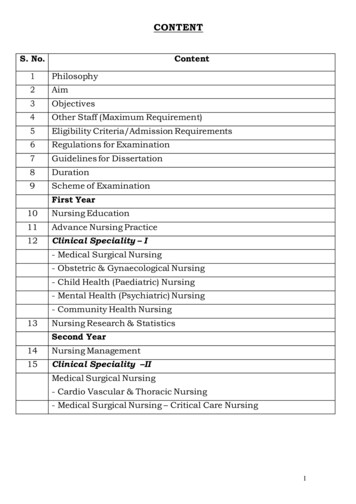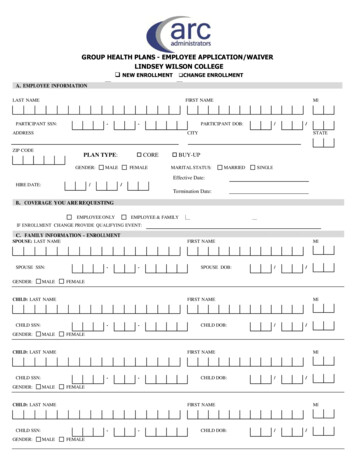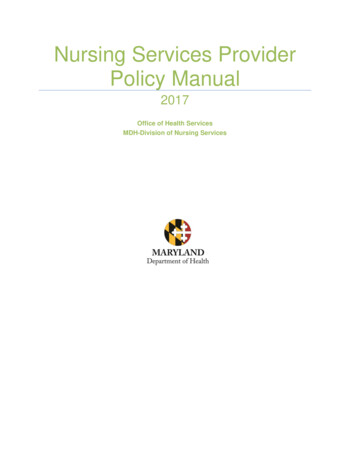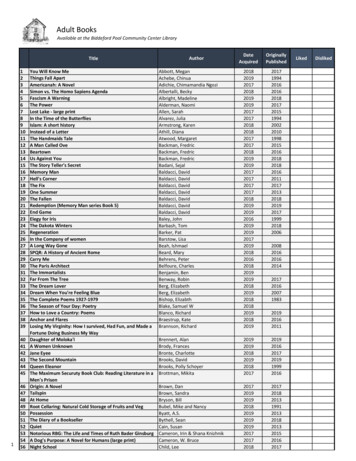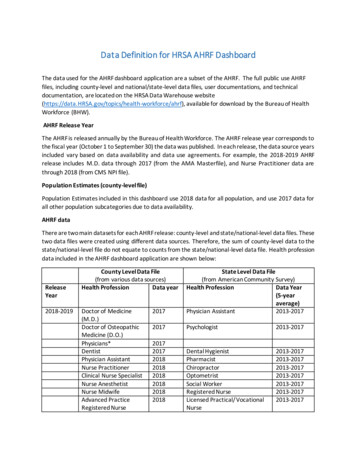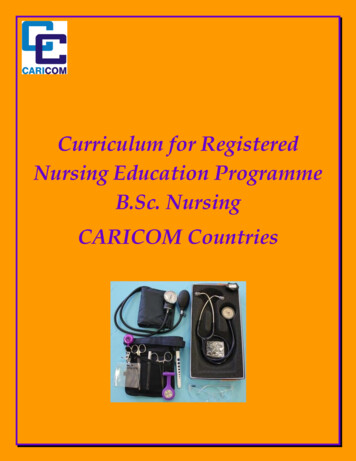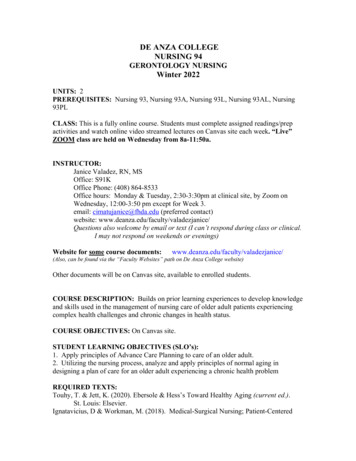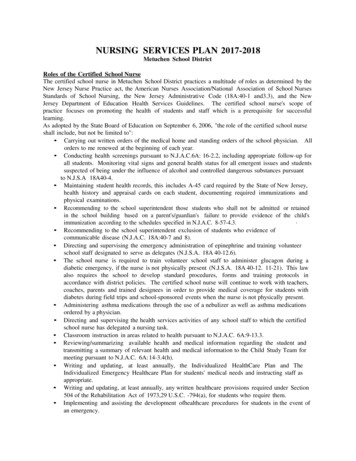
Transcription
NURSING SERVICES PLAN 2017-2018Metuchen School DistrictRoles of the Certified School NurseThe certified school nurse in Metuchen School District practices a multitude of roles as determined by theNew Jersey Nurse Practice act, the American Nurses Association/National Association of School NursesStandards of School Nursing, the New Jersey Administrative Code (18A:40-1 and3.3), and the NewJersey Department of Education Health Services Guidelines. The certified school nurse's scope ofpractice focuses on promoting the health of students and staff which is a prerequisite for successfullearning.As adopted by the State Board of Education on September 6, 2006, "the role of the certified school nurseshall include, but not be limited to": Carrying out written orders of the medical home and standing orders of the school physician. Allorders to me renewed at the beginning of each year. Conducting health screenings pursuant to N.J.A.C.6A: 16-2.2, including appropriate follow-up forall students. Monitoring vital signs and general health status for all emergent issues and studentssuspected of being under the influence of alcohol and controlled dangerous substances pursuantto N.J.S.A 18A40-4. Maintaining student health records, this includes A-45 card required by the State of New Jersey,health history and appraisal cards on each student, documenting required immunizations andphysical examinations. Recommending to the school superintendent those students who shall not be admitted or retainedin the school building based on a parent's/guardian's failure to provide evidence of the child'simmunization according to the schedules specified in N.J.A.C. 8-57-4.3.· Recommending to the school superintendent exclusion of students who evidence ofcommunicable disease (N.J.A.C. 18A:40-7 and 8). Directing and supervising the emergency administration of epinephrine and training volunteerschool staff designated to serve as delegates (N.J.S.A. 18A 40-12.6). The school nurse is required to train volunteer school staff to administer glucagon during adiabetic emergency, if the nurse is not physically present (N.J.S.A. 18A 40-12. 11-21). This lawalso requires the school to develop standard procedures, forms and training protocols inaccordance with district policies. The certified school nurse will continue to work with teachers,coaches, parents and trained designees in order to provide medical coverage for students withdiabetes during field trips and school-sponsored events when the nurse is not physically present. Administering asthma medications through the use of a nebulizer as well as asthma medicationsordered by a physician. Directing and supervising the health services activities of any school staff to which the certifiedschool nurse has delegated a nursing task. Classroom instruction in areas related to health pursuant to N.J.A.C. 6A:9-13.3. Reviewing/summarizing available health and medical information regarding the student andtransmitting a summary of relevant health and medical information to the Child Study Team formeeting pursuant to N.J.A.C. 6A: 14-3.4(h). Writing and updating, at least annually, the Individualized HealthCare Plan and TheIndividualized Emergency Healthcare Plan for students' medical needs and instructing staff asappropriate. Writing and updating, at least annually, any written healthcare provisions required under Section504 of the Rehabilitation Act of 1973,29 U.S.C. -794(a), for students who require them. Implementing and assisting the development ofhealthcare procedures for students in the event ofan emergency.
Instructing faculty/staff on communicable disease and other health concerns, pursuant to N.J.S.A.18 A:40-3; andProviding other nursing services consistent with the school nurse's education servicescertification endorsement as a school nurse issued by the State Board of Examiners and currentlicense approved by the State Board of Nursing.The goals of school nursing are health protection and health promotion. The Metuchen Public SchoolDistrict has 14 certified school nurses who are responsible for the health needs of the students whoattend our schools. In an ongoing effort to ensure that students remain healthy and ready to learn, thecertified school nurse takes on the roles of the following:Health Services Manager: The School Nurse works in an environment where priorities can changemany times a day. She assumes a wide variety of roles and must meet specific deadlines according topre-determined schedules. In order to balance all of the demands made on her, at any given time, theSchool Nurse must also be an efficient manager. In addition to the daily routines/occurrences, thenurse, as manager, must always be alert and ready to assess and manage any emergency/healthproblem that presents itself during the school day. For this reason, the School Nurse must be able toprudently and independently prioritize and deliver health care that best meets the needs of the child inthe situation at hand. Prioritization, delegation and communication are the key components to aneffective manager. The School Nurse Prepares st tte reports on immunizations and tuberculosis andcontinues to replenish expired medical supplies for the school; this includes updating medicalequipment.Nursing Care Provider: The certified school nurse (CSN) provides nursing care utilizing the nursingprocess of assessment, planning, intervention, evaluation, implementation, and re-evaluation. TheCSN reviews all field trips for nursing care that will be needed including administration ofmedication, treatments and student monitoring and arranges for additional nursing coverage asneeded.Investigator: The CSN obtains information regarding health histories, health practices, environmentalconcerns, safety issues, communicable disease patterns, and current health information relevant to thepractice of school nursing. Data is gathered through consultation with parents/guardians, primarycare physicians and specialists, and workshops.Communicator: Information directed to students, parents/guardians, staff members, administration,physicians, health care and governmental agencies is disseminated via telephone conferences, writtenconununication, parent/staff conferences, staff meetings/in-services, I&RS meetings, CST/504meetings, newsletter inserts and flyers, School Health Web site. The CSN is frequently called uponto counsel students and staff regarding health issues and personal concerns. Referrals andrecommendations for follow up are made as appropriate to the school guidance counselor, privatephysicians and other community health resources.Educator: In addition to N.J.S.A. 18A:40-3, the CSN also provides parent and student educationthrough one-to-one conferences, education flyers, posting via School Health Web site and writtenmaterials. Staff education includes yearly presentations for students' medical concerns and universalprecautions. EpiPen, glucagon, CPR/AED training and review during the school year for volunteerstaff is provided by the CSN.Counselor: School nurses serve in the role of counselor to students, parents and staff alike regardinghealth issues and personal concerns. Referrals are made to the Child Study Team case managers,
school counseling staff, student assistance counselor, private physicians, or community healthresources, as needed.Child Advocate: As child advocates, school nurses work closely with staff and families to facilitatethat health needs and accommodations are identified and met. Advocacy can extend beyond thesearenas to include referrals for health services, counseling, community programs, camps, and DCP&P.Community Liaison: In the role of community liaison, the school nurses work with local groups andorganizations to bring special programs in the schools.Recorder: A time-consuming role for school nurses I the role of recorder. In addition to requiredstate health record for each student (A-45), results of screenings, physical examination, sportsphysicals, changes in health statues, treatments, medications and student/employee accidents must bedocumented. Pertinent communications from parent/guardians and physicians must be incorporatedinto the student health record. Daily logs of health office visits with date, time, complaint,assessment, intervention, and evaluation are maintained for each student who visits the health office.Individual medication sheets must be maintained for all students receiving medication on daily or asneeded basis. Data must be collected and recorded for state agencies related to immunizations,tuberculosis testing, and employee injuries. Compliance for state mandated Wellness Plan ofstudent's height and weight will be documented. Currently the nursing staff is in the process ofentering immunizations as well as student daily visits into the database. As the use of the healthdatabase increases, the nurses will enter additional health information such as screening results andpertinent medical information.Consideration must also be given to the special education population. Severity coding can be brokendown into four levels: Nursing Dependent, Medically Fragile, Medically complex, and HealthConcerns.Level I: Nursing dependent: Nursing dependent students require 24 hours/day, frequently one toone, skilled nursing care for survival. Many are dependent on technological devices for breathing, forexample, a student on a ventilator, and/or require continuous nursing assessment and intervention.With the use of the correct medical technology and nursing care, the student will experienceirreversible damage or death.Level II: Medically Fragile: Students with complicated health care need in this category face eachday with the possibility of a life-threatening emergency requiring the skill and judgment of a skilledCSN. Examples may include, but are not limited to: severe seizure disorder requiring medication,severe asthma, sterile procedures, tracheostomy care with suctioning, unstable or newly diagnoseddiabetic with unscheduled blood glucose monitoring and insulin injections, diabetics with insulinpumps requiring monitory, and asthmatics requiring nebulizer treatments.Level III: Medically Complex: Students with medically complex concerns require daily treatmentsor close monitoring by a CSN. They may have unstable physical and/or social-emotional conditionsand the potential for a life-threatening event may exist. Examples include, but are not limited to:ADHD and on medication, anaphylactic event, cancer, immune disorders, moderate to severe asthma(inhaler, peak flow meter), preteen or teenage pregnancy, carefully timed medications, medicationswith major side effects, unstable metabolic conditions, continuous or intermittent oxygen andcomplex mental or emotional disorders.Level IV: Health Concerns: In the category of health concerns, the student's physical and/or socialemotional condition is currently uncomplicated and predictable. Occasionally, the student requires
monitoring, which may vary from biweekly to annually. Examples include, but are not limited todental disease, headaches, migraines, sensory impairments, diabetes self-managed by the student,dietary restrictions, eating disorders, orthopedic conditions requiring accommodations and encopresis.Metuchen School District: Medical InvolvementGrade Level: Pre K -12/School Population as of September 2, 2015: 304General Education Enrollment:Special Education Enrollment: in district, out of districtStudents with significant medical involvement"Level I: Nursing Dependent:0Level III Medically Complex:Level II: Medically Fragile:Level IV: Health Concerns:For the safety of the school population a Certified School Nurse should be maintained full time atMetuchen School District School. Prior to participation on school-sponsored athletic teams,documentation of the School Physicians approval or denial for any student participating on a sportsteam in accordance with N.J.A.C. 6A:16-2.2 must be maintained.Reviewed by Dr. K. Lukenda, MD/School Medical Inspector:l);,kQfKLUkenda, MDDate
Requirements of Staffing:Certified School Nurse (CSN): Functions to the level of professional license as a licensed registerednurse and school nurse certification. The CSN fulfills the duties of the Registered Nurse cited in code.She can also perform the following: Teach health classes; develop curriculum; conduct staff trainings;select aud train delegates to administer EpiPen and glucagon; review, summarize and transmit availablehealth and medical information in preparation for Child Study Team meetings; write and update annually(or more often) accommodation plans included in IHP required under Section 504 as required; developand implement the school health programs as per New Jersey Nurse Practice Act, ANAINASN Standardsof School Nursing, NJAC and the NJ Department of Education Health Services Guidelines; CPRAEDcertification; conduct health screenings; maintain student health records; assess and recommend studentsto be excluded for communicable diseases; recommend students to be excluded for inadequateimmunizations.Out-or-District Students: Students needing intensive nursing services who are placed out-of-district areprovided those services through a nursing service or by the school in which they are placed.Emergency Safetv and Securitv Plans (N/JIA!C/ 6A 16-2.1 (b) 2 (iii)):A. Acute Care Management Plan:1) Create and maintain Emergency Management Kit ("Go-box", AEDs) for utilizationin crisis, emergency evacuations, and/or shelter-in-place.2) Cardiac and Respiratory Distress Action Plans.B. IEHP's Care Management plan:1) Epinephrine Auto-Injector/Anaphylaxis Action Plan.2) Asthma Action PlanC. District Crisis Management Plan" Metuchen School District "Emergency and CrisisManagement Plan2014-15" outlines the procedures for medical emergencies, intruders, frre,bomb threat, evacuation, lock down, etc.D. Community Rescue Squad and Emergency Paramedic ServicesSchool Complex: There is one Certified School Nurse assigned to each Metuchen School District school.The school building is a unit unto itself and there are no complexes in this district. The distance withinthe building varies including the outside field and playground, the primary type of communication inplace to communicate within the building are the telephone, e-mail, walkie-talkies and over-head publicaddress system.Services Performed by Metuchen School District:ATTENDANCE: Call parents & other contacts is student not reported absent/late, as per individual school.Contact Principal if student not found.Alert front office throughout the day if student sent home ill.Secure documentation for chronic illoesses on students that affect attendance.
MEDICATION/TREATMENTS Send home required forms every year to parent of students requiring daily or pm medicationsFollow u on incomplete forms and forms not returned by parents Call parents for refillsAdminister medication as ordered (may include locating students who forget to come formedication)Monitor and address expiration dates of medicationsMake medication sheets for daily and emergency and pm medicationsOver the Counter medication given as needed after obtaining parental permission and primarymedical doctor's order- i.e. Tylenol, ibuprofen, Benadryl- given in accordance witb ourstanding ordersCare for students witb asthma includes: obtain astbma action plan from student's doctor andassist witb inhaler administration; oversee the use of nebulizer when required; staff education;coordinate astbma action plans with coaches for students participating in school-sponsored sports;students with asthma indentified to tbe nurse who are in need of an action planEpipens: Train volunteer delegates; send list of delegates to parents, receive and maintaindocumentation from parents; order and maintain medication (school epipens are ordered by theCSN/ parents provide dual epipen pack for tbeir child); provide staff education regarding studentallergies and tbe modifications tbat are required to maintain student health (i.e. maintainingsegregated eating area for students witb nut allergies, parent notification of upcoming parties,storage of "safe snack" for students with food allergy, letters sent home to classes witb foodallergy alert); communicate with coach of students witb epipen for any school sponsored sport REQUIREDDOCUMENTATION: Annual Tuberculosis Report (State)Annual Immunization Report (State)Daily/Monthly checks of all AEDsFilling Accident Reports for staff and students, sending home insurance forms as neededChart all physicalsStudent health concerns, results of physicals, daily logs of health office visits, A-45 (State)TB compliance for all new staff and studentsObtaining health records and information for all new students, including kindergarteners and preschool (may include parent interviews and contact with previous district)Order and maintain suppliesCompile health packet for staff annuallyScreening for I&RS and Special Education referralsHEALTH SCREENINGS (required documented on A-45 (State))Elementary: Height, weight, blood pressure : all students Hearing- Pre-K, I", 2"d, 3'd, grade students Vision: Pre-K, Kindergarten, 2nd and 4th grade students
Color (vision): I" grade studentsMiddle School: Height, weight, blood pressure: all students Scoliosis: 5" grade students Vision: 6" and 8th grade students Hearing and scoliosis: 7" grade students.High School: Height, weight, blood pressure : all students Scoliosis: 9tl' and 11th grade students Vision: 1Otl' grade students Hearing: Ith grade studentsFIELD TRIPS: Obtain information regarding field trip from staff (i.e. where, when, who, food served) Arrange for nurse/parent/delegate to attend when necessary; inform substitute nurse attending tripre: student medical needs, coordinate with chaperones re: connecting students with nurse atspecific times for medical needs and for medical needs that arise during trip Call parents to coordinate medication/medical issues Update/pack supplies for trip (first aid, medications)HEAD LICE: Following American Academy of Pediatrics Guidelines: Monitor students/classes for head lice Send home lice information to classes Frequent contact with parents Check affected students/classes to insure there is no re-infestationTOILETING ISSUES: Assist students with toileting if required by physician/IEP Changing/assisting student pre-K through 8 who have been incontinent Assisting female students with menstrual issues (education, supplies, changing soiled clothes)DAILY TRAFFIC: Staff visits are usually self managed (i.e. Tylenol, ibuprofen). Also BP checks, doctor/dentistreferrals, accidents. Assess staff, students ad visitors coming to the health office with a variety ofhealth concerns an provide care when appropriate Students are seen for a variety of reasons, some of which are: Check temperature, inspect throat,c/o earaches, auscultate lungs for c/o cough or breathing issues, nosebleeds, eye complaints,stomachaches, hunger, GI complaints, headaches, dizziness, flu, treatment of infected wounds,rashes, allergic reactions, body aches, ovarian cysts, appendicitis, autism, post surgical, menstrualcramps. First aid: minor and major accidents, abrasions, lacerations, sprains, strains, fractures,head injuries, jannned fmgers, contusions, fainting, braces repair, broken teeth, burns, beestings,bites. Other: eyeglass repair, tie shoes, fix zippers, changing wet or muddy clothes, gum in hair,gum n clothes/shoes removal, giving snacks (crackers) when student did not bring snack to
school, keeping student end of day when student too sick to go home on bus. Manage studentwith cardiac pacemaker, monitor vital signs for signs/symptom fatigue/chest pain/abdominaltrauma. Emotional Needs: Frequently confer with guidance counselor, CST case managers,administrators, teachers as needed to provide holistic approach. Care and follow up on studentsself injure, counsel students with hygiene issues, manage chronic illness of students (mitralstenosis, Crohn's disease, Lupus Lyme disease, Type 1 diabetes)SECONDARY LEVEL SPORTS: Work with parents and Athletic Director to provide and obtainrequired Health Update Forms 3 times a year. Frequent contact with parents to explain process ofmedical clearance and follow up calls for forms not handed in as to meet deadlines for practice.Coordinate forms, ftll in vitals not completed by the student's doctor, make appointment for school doctorto review forms, compile list for coaches, and contact parents with recommendations given by schoolphysician upon receipt f forms. Collaborate with coaches re" injuries occurring during practices andgames. Have ALL parents, who have a child participating in a school sponsored sport, sign concussionagreement and cardiac pamphletHEALTH EDUCATION: For staff: In service at the beginning of each school year on student medical concerns andUniversal Precautions, teach lessons at teachers' request Daily teaching with students about their health Epipen training and Glucagon training to volunteers Teaching parents and directing them to outside resources for healthcareOTHER: Coordinate indoor recess for students unable to go outside for medical reasons; wellnessexcuses documented through Health Office; communicate PE/Recess restrictions to staff; copy and recordnotes from doctor for PE; reentry meetings with parent/guardian for students returning afterhospitalizations/surgeries; as requested attend parent meetings; referrals to the Department of Childrenand Families (DCF() as needed; flu clinic for staff each year; kindergarten registration and begindocumentation in Genesis.
Nursing Care Provider: The certified school nurse (CSN) provides nursing care utilizing the nursing process of assessment, planning, intervention, evaluation, implementation, and re-evaluation. The CSN reviews all field trips for nursing care that will be needed including administration of medication, treatments and student monitoring and .



